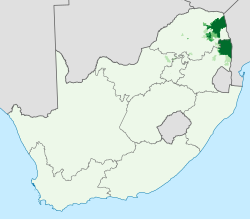
Back Tsonga Afrikaans शंगानी भाषा ANP لغة تسونغا Arabic Idioma tsonga AST Tsonqa dili Azerbaijani Цонга Bulgarian Tsongeg Breton Tsonga Catalan Tsonga Czech Tsonga (sprog) Danish
This article has multiple issues. Please help improve it or discuss these issues on the talk page. (Learn how and when to remove these messages)
|
| Tsonga | |
|---|---|
| Xitsonga | |
| Native to | |
| Region | |
| Ethnicity | Tsonga |
Native speakers | 3.7 million (2006–2011)[1] 3.4 million L2 speakers in South Africa (2002)[2] |
| Latin (Tsonga alphabet) Tsonga Braille | |
| Signed Tsonga | |
| Official status | |
Official language in |
|
Recognised minority language in | |
| Language codes | |
| ISO 639-1 | ts |
| ISO 639-2 | tso |
| ISO 639-3 | tso |
| Glottolog | tson1249 |
S.53 (S.52)[3] | |
| Linguasphere | 99-AUT-dc incl. varieties 99-AUT-dca... -dcg |

| Tsonga | |
|---|---|
| Person | Mutsonga |
| People | Vatsonga |
| Language | Xitsonga |
Tsonga (/ˈ(t)sɒŋɡə/ ⓘ (T)SONG-gə) or Xitsonga as an endonym (also known as Changana in Mozambique), is a Bantu language spoken by the Tsonga people of South Africa and . It is mutually intelligible with Tswa and Ronga and the name "Tsonga" is often used as a cover term for all three, also sometimes referred to as Tswa-Ronga. The Xitsonga language has been standardised as a written language.
Tsonga is an official language of the Republic of South Africa, and under the name Shangani it is recognised as an official language in the Constitution of Zimbabwe. All Tswa-Ronga languages are recognised in Mozambique. It is not official in Eswatini (formerly known as Swaziland).
- ^ Tsonga at Ethnologue (18th ed., 2015) (subscription required)
- ^ Webb, Vic. 2002. "Language in South Africa: the role of language in national transformation, reconstruction and development". Impact: Studies in language and society, 14:78
- ^ Jouni Filip Maho, 2009. New Updated Guthrie List Online